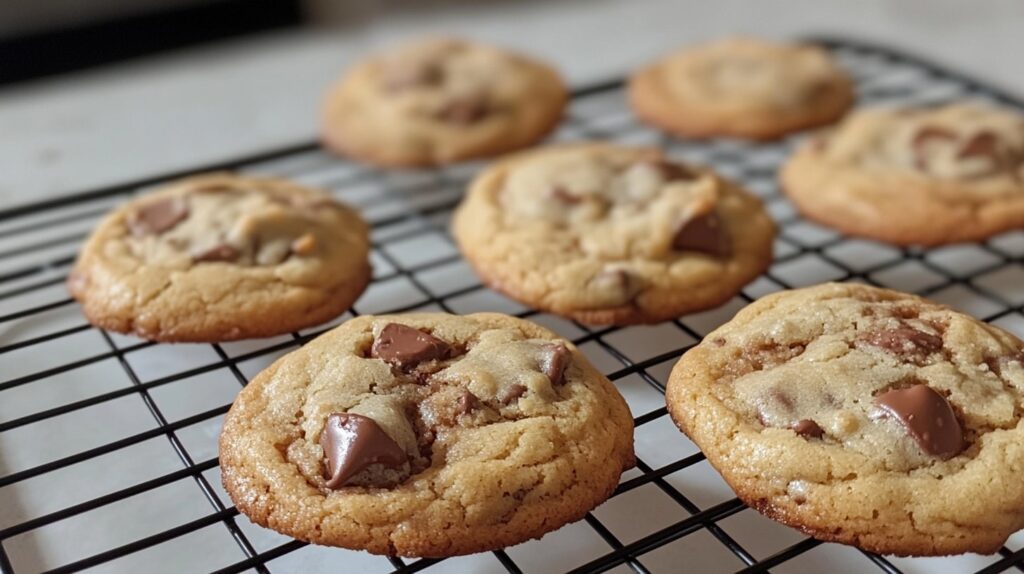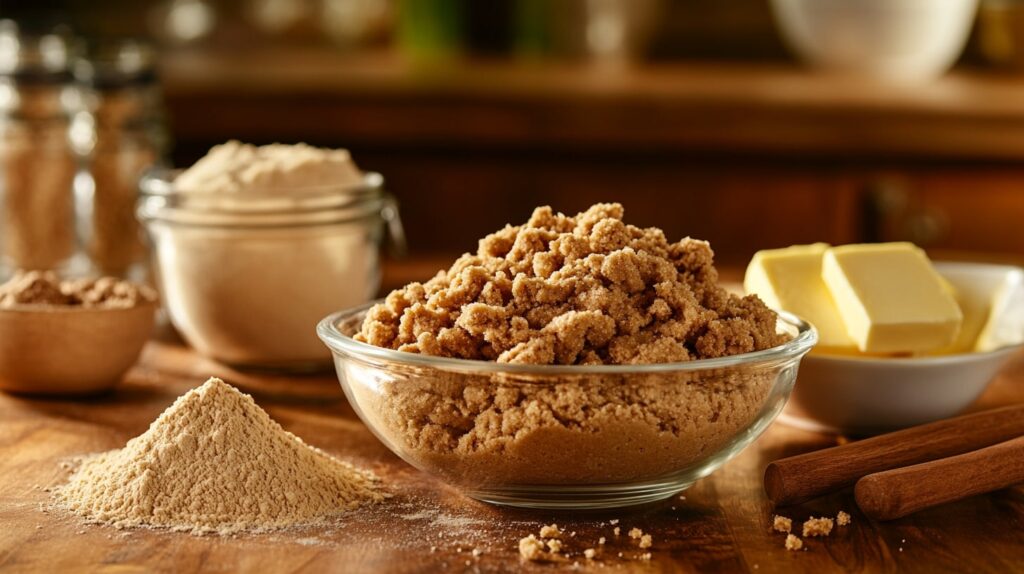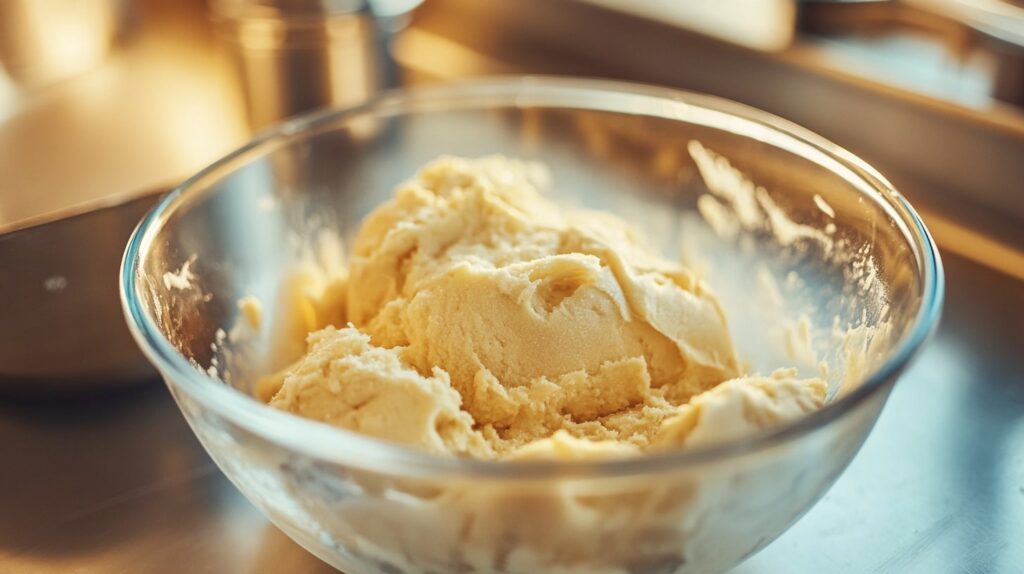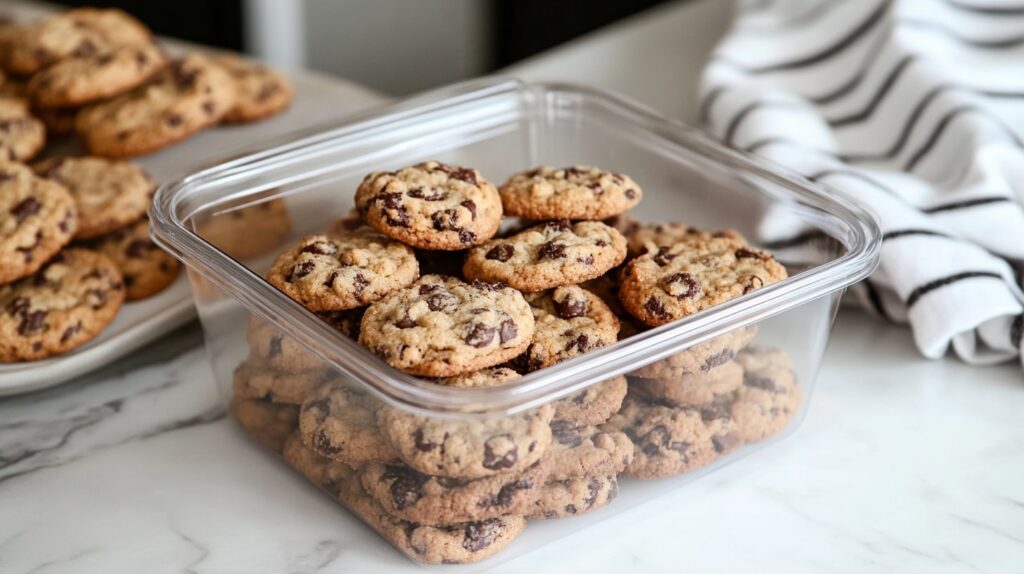
Who doesn’t love biting into a soft, chewy cookie? There’s just something magical about that first warm bite melting in your mouth. But if you’ve ever baked cookies at home, you know how tricky it can be to keep them soft. One minute, they’re fresh out of the oven, perfectly moist. A few hours later, they resemble hockey pucks. So, what’s the secret ingredient to keep cookies soft? Everyone who bakes at home wonders how to achieve the perfect chewy texture. Let’s embark on a delicious journey to uncover the truth about the secret ingredient to keep cookies soft and how to bake them perfectly every time.
Table of contents
The Science Behind the Secret Ingredient to Keep Cookies Soft 🔬
Before we jump into secret ingredients, let’s understand the science behind cookies. Baking isn’t just an art; it’s also chemistry. The way ingredients interact with each other—and with heat—determines your cookie’s final texture.
When you bake cookies, moisture is your best friend. The more moisture in your dough, the softer your cookies will be. The trick is to keep that moisture locked in for as long as possible.
Why Do Cookies Harden Over Time?
Ever left cookies on the counter overnight, only to find them rock-hard by morning? It happens because of moisture loss. When cookies are exposed to air, the water inside them evaporates. The sugar also crystallizes, making the cookies stiff and brittle.
To combat this, we need to focus on ingredients and techniques that trap moisture and slow down evaporation.
Understanding Moisture Retention in Baking
So, how do you keep moisture from escaping? Here are a few key factors that affect the secret ingredient to keep cookies soft and moisture retention:
- Ingredients: Certain ingredients like fats and sugars hold onto moisture better than others.
- Baking Time and Temperature: Overbaking zaps the moisture right out of your cookies.
- Storage: Properly sealing cookies keeps the air out and the moisture in.
Top Secret Ingredients to Keep Your Cookies Soft 🕵️♂️
The real question: What is the secret ingredient to keep cookies soft? Actually, there are several! Each one has its own magical properties that help your cookies stay deliciously chewy.

The Role of Brown Sugar in Soft Cookies
Brown sugar is a classic secret ingredient for soft cookies. But why? Brown sugar contains molasses, which adds moisture and gives cookies a chewy texture. It also helps retain water longer than white sugar does.
👉 Pro Tip: Replace some (or all) of the white sugar in your recipe with brown sugar. For example:
| Ingredient | Quantity |
|---|---|
| White Sugar | 1/2 Cup |
| Brown Sugar | 1 Cup |
This little switch can make a big difference.
“Brown sugar is the key to rich, molasses-kissed cookies that stay soft for days.”
How Cornstarch Contributes to the Secret Ingredient to Keep Cookies Soft
Cornstarch may seem like a strange ingredient for cookies, but it’s a game-changer! It helps create a tender, melt-in-your-mouth texture by softening the proteins in the flour.
Adding just 1 to 2 teaspoons of cornstarch to your cookie dough can give you that bakery-style softness you crave.
Using Honey and Molasses for Added Moisture
Honey and molasses are both liquid sweeteners that add moisture to your dough. They also help your cookies stay soft longer because they naturally attract water (a process called hygroscopy).
Substitute a small amount of honey or molasses for white sugar in your recipe. For instance:
| Sugar | Honey/Molasses |
|---|---|
| 1 Cup Sugar | 3/4 Cup + 1/4 Cup Honey |
Key Baking Techniques to Use the Secret Ingredient to Keep Cookies Soft 🧑🍳
Ingredients are half the battle. How you bake your cookies also plays a huge role in keeping them soft. Mastering the secret ingredient to keep cookies soft ensures your treats remain chewy and delicious.
Proper Dough Chilling for Texture Control

Chilling cookie dough is one of the best-kept secrets of professional bakers. When you chill your dough, a few magical things happen:
- Fats solidify, which means your cookies spread less in the oven.
- Flavors deepen as the ingredients meld together.
- Texture improves because the dough’s moisture is evenly distributed.
Chill your dough for at least 1 hour, or even overnight. The longer, the better!
👉 Pro Tip: If you’re short on time, pop your dough in the freezer for 30 minutes.
“A well-rested dough makes for cookies that are soft, thick, and perfectly chewy.”
Baking Times and Temperatures for Soft Cookies
Timing is everything! Overbaking is the quickest way to ruin soft cookies. For soft, chewy cookies, you want to:
- Bake at 350°F (175°C).
- Pull the cookies out just before they look done. The edges should be set, but the center should look slightly underbaked.
Cookies continue to bake on the hot pan even after you take them out of the oven, so trust the process!
The Importance of Not Overmixing the Dough
Overmixing is a common mistake that leads to tough cookies. When you mix dough too much, you develop gluten, which makes cookies dense and chewy in a bad way.
Mix until just combined. Your dough should look lumpy, not silky smooth.
How Storage Affects Cookie Softness 📦
Even the softest cookies can harden if stored incorrectly. Here’s how to keep your cookies fresh and chewy for days.
Best Practices to Store Cookies and Retain the Secret Ingredient to Keep Cookies Soft
To keep cookies soft and chewy:
- Let them cool completely before storing.
- Use an airtight container to lock in moisture.
- Add a slice of bread to the container. The bread will release moisture, keeping the cookies soft.

How to Re-Soften Hardened Cookies Easily
Cookies already hard? No worries! You can rescue them:
- Microwave Trick: Place a cookie in the microwave with a damp paper towel. Heat for 10-15 seconds.
- Oven Method: Warm cookies in the oven at 300°F (150°C) for 5 minutes.
“A little heat can bring even the hardest cookie back to life!”
Common Problems and Solutions for Keeping Cookies Soft 🤔
We’ve all faced baking mishaps that leave us wondering, What went wrong? Let’s troubleshoot the most common cookie issues and their solutions.
Why Do My Cookies Turn Out Hard? Solutions to Try
Nothing’s more disappointing than biting into a freshly baked cookie that’s hard as a rock. Here are the top reasons this happens and how to fix them:
- Overbaking:
- Problem: Baking cookies even a minute too long can zap their moisture.
- Solution: Take cookies out of the oven when they look slightly underdone. They’ll firm up as they cool.
- Not Enough Fat:
- Problem: Cookies need fat (like butter or shortening) for tenderness. Too little fat results in dry, crumbly cookies.
- Solution: Stick to the recipe’s fat measurements, and consider adding an extra tablespoon of butter for extra richness.
- Too Much Flour:
- Problem: Over-measuring flour leads to a dense dough and dry cookies.
- Solution: Spoon flour into your measuring cup and level it off with a knife. Don’t pack it down!
“Baking is all about balance. Too much flour or too little fat can ruin that perfect softness you’re craving.”
Fixing the Problem of Dry Cookie Dough
Dry cookie dough is a red flag for hard cookies. Here’s how to salvage it:
- Add More Fat: Mix in a tablespoon of softened butter or oil.
- Add Liquid: A splash of milk, cream, or even a beaten egg yolk can work wonders.
- Don’t Overmix: Overworking the dough activates gluten, making it tougher.
How Humidity Impacts Cookie Softness and How to Counter It
Humidity—or lack thereof—can mess with your cookies. In dry climates, cookies lose moisture faster. In humid climates, they might become too soft or sticky.
Solutions for Dry Climates:
- Store cookies with a slice of bread to retain moisture.
- Add a bit more brown sugar or honey to your dough.
Solutions for Humid Climates:
- Bake cookies a minute longer to prevent them from becoming too gooey.
- Use airtight containers with silica gel packets to absorb excess moisture.
Ingredient Substitutions for Softer Cookies 🔄
Sometimes you don’t have the exact ingredients on hand, or you want to experiment. Here are some substitutions that can help you achieve soft cookies.
Replacing White Sugar with Brown Sugar for Extra Chewiness
White sugar gives cookies a crisp texture, while brown sugar keeps them moist and chewy.
Substitute Ratio:
Replace 1 cup of white sugar with 1 cup of brown sugar for a richer, chewier cookie.
Substituting Butter with Shortening for Moisture Retention
Butter adds flavor but can lead to crispier cookies due to its water content. Shortening, on the other hand, keeps cookies soft because it contains no water.
Butter to Shortening Swap:
- For softer cookies, replace half or all the butter with shortening.
- Tip: Add a tablespoon of water if using all shortening to balance moisture.
| Ingredient | Quantity |
|---|---|
| Butter | 1/2 Cup |
| Shortening | 1/2 Cup |
Recipe Modifications for Achieving Soft Cookies 📝
Sometimes, achieving perfect cookies requires a few tweaks to your recipe. Here’s how to modify your recipe for softer cookies.
How to Adjust Flour and Fat Ratios for Texture
The flour-to-fat ratio greatly influences cookie texture. More fat = softer cookies. More flour = denser cookies.
Soft Cookie Formula:
- Use a 2:1 flour-to-fat ratio. For every 2 cups of flour, use at least 1 cup of fat (butter, shortening, or oil).
Incorporating Pudding Mix for Ultra-Soft Cookies
Adding instant pudding mix to your cookie dough is a baker’s secret for ultra-soft cookies. The cornstarch in the pudding mix helps retain moisture.
How to Use Pudding Mix:
- Add 1 small box (3.4 oz) of instant vanilla pudding mix to your cookie dough.
- You can skip some sugar since pudding mix adds sweetness.
“Pudding mix: the secret ingredient for cookies that stay soft and chewy for days!” 🍮
Expert Tips and Tricks for Soft-Baked Cookies 💡
Want to know the tricks that professional bakers use? Here are some pro-level hacks for baking the softest cookies.
Adding Extra Egg Yolks for Rich Softness
Egg yolks add richness and moisture. The fat in the yolk helps make cookies tender and chewy.
Tip: For every egg in the recipe, add an extra yolk. This trick is especially great for chocolate chip cookies.
| Ingredient | Quantity |
|---|---|
| Whole Eggs | 1 |
| Extra Egg Yolks | 1 |
Secrets from Professional Bakers for Perfect Texture
- Use Bread Flour: Bread flour has more protein than all-purpose flour, which gives cookies a chewy texture.
- Rest the Dough: Chill the dough overnight to let the flavors develop.
- Double Pan Method: Place your baking sheet on top of another empty baking sheet. This prevents the bottoms from overbaking.
Frequently Asked Questions About Keeping Cookies Soft ❓
Can You Keep Cookies Soft Without Special Ingredients?
Absolutely! Storing cookies properly (airtight containers, bread slices) and not overbaking them are key steps. Even without fancy ingredients, good technique goes a long way.
How Long Can Soft Cookies Stay Fresh?
Soft cookies typically stay fresh for 3 to 5 days when stored properly in an airtight container. For longer storage, freeze them for up to 3 months.
Secrets for Achieving Perfectly Soft Cookies Every Time 🌟
By now, we’ve covered ingredients, techniques, and substitutions, but there are a few more insider secrets that can take your cookie game to the next level.
Use a Combination of Sugars
A blend of white sugar and brown sugar creates the ideal balance of crisp edges and a soft, chewy center. While brown sugar provides moisture due to its molasses content, white sugar helps with spreading and caramelization.
Perfect Ratio for Soft Cookies:
- 3/4 cup brown sugar
- 1/4 cup white sugar
This ratio ensures your cookies will stay soft and chewy while having a hint of crispy goodness on the edges.
Don’t Skip the Vanilla Extract
Vanilla extract isn’t just about flavor; it also contributes to the overall texture of your cookies. The alcohol content in vanilla helps prevent cookies from becoming overly dense.
Tip: Use pure vanilla extract instead of imitation vanilla for a richer flavor. For extra flair, try adding a touch of almond extract for a subtle twist.
“A splash of vanilla isn’t just for taste—it’s the magic touch for dreamy, soft cookies.”
Add a Touch of Corn Syrup
Corn syrup helps retain moisture in cookies, keeping them soft and chewy for longer. Even just a tablespoon can work wonders.
How to Use It:
- Add 1 tablespoon of light corn syrup to your dough. It enhances moisture without making the cookies overly sweet.
Baking Equipment That Helps Keep Cookies Soft 🛠️
Sometimes, the tools you use can impact the outcome of your cookies. Let’s look at essential baking gear to help you achieve soft, chewy perfection.
Silicone Baking Mats or Parchment Paper
Using a silicone baking mat or parchment paper helps cookies bake evenly. These non-stick surfaces ensure cookies don’t over-brown on the bottom, which can lead to hard textures.
Cooling Racks
Cooling your cookies properly is critical. If you leave them on a hot baking sheet too long, they’ll continue to cook and dry out. Transfer cookies to a cooling rack after 2-3 minutes to stop the baking process and keep them soft.
Nutrition Facts for Soft Cookies 🍽️
Curious about what goes into a typical batch of soft cookies? Here’s a general breakdown of nutritional information for a standard chocolate chip cookie.
| Nutrient | Amount Per Cookie (Approx. 2.5 inches) |
|---|---|
| Calories | 160 |
| Total Fat | 8g |
| Saturated Fat | 5g |
| Carbohydrates | 22g |
| Sugars | 14g |
| Protein | 2g |
Note: Nutritional values may vary depending on the specific recipe and ingredients used.
A Simple Soft Cookie Recipe to Try 👩🍳
Let’s put everything we’ve learned into action with a foolproof recipe for soft and chewy chocolate chip cookies.
Ingredients 📝
| Ingredient | Quantity |
|---|---|
| Unsalted Butter (softened) | 1/2 Cup |
| Brown Sugar | 1 Cup |
| White Sugar | 1/4 Cup |
| Egg | 1 Large |
| Extra Egg Yolk | 1 |
| Vanilla Extract | 2 Teaspoons |
| All-Purpose Flour | 2 Cups |
| Cornstarch | 2 Teaspoons |
| Baking Soda | 1 Teaspoon |
| Salt | 1/2 Teaspoon |
| Chocolate Chips | 1 Cup |
Instructions 🥣
- Preheat your oven to 350°F (175°C). Line a baking sheet with parchment paper or a silicone baking mat.
- In a large bowl, cream together the softened butter, brown sugar, and white sugar until light and fluffy (about 2-3 minutes).
- Add the egg, extra yolk, and vanilla extract and mix until well combined.
- In a separate bowl, whisk together the flour, cornstarch, baking soda, and salt.
- Gradually add the dry ingredients to the wet ingredients, mixing until just combined. Fold in the chocolate chips.
- Chill the dough for at least 1 hour (or overnight for best results).
- Scoop tablespoon-sized portions of dough onto the prepared baking sheet.
- Bake for 10-12 minutes, or until the edges are golden but the centers look slightly underdone.
- Let the cookies cool on the baking sheet for 2 minutes, then transfer to a cooling rack.
- Enjoy your perfectly soft, chewy cookies! 🍪
Frequently Asked Questions About Keeping Cookies Soft ❓
Can You Freeze Soft Cookies?
Yes! To keep cookies soft, place them in an airtight container or freezer bag and freeze for up to 3 months. When you’re ready to enjoy them, thaw at room temperature or warm them in the microwave for 10-15 seconds.
Why Do My Cookies Go Flat and Hard?
Flat, hard cookies often result from too much butter or not enough flour. Make sure you measure your ingredients correctly and chill your dough to prevent spreading.
Is It Better to Use Butter or Shortening for Soft Cookies?
Both work, but shortening yields softer cookies because it doesn’t contain water like butter does. For the best of both worlds, try using a combination of butter and shortening.
Explore More Delicious Baking Secrets! 🍪
Now that you know what is the secret ingredient to keep cookies soft, why stop here? Check out these other must-read articles to take your baking skills to the next level:
- Discover how to master the art of combining flavors with our Ultimate Crookie Recipe — a delightful blend of cookie and croissant! 🥐
- Need an easy swap for your baking ingredients? Learn about the Best Brown Sugar Substitutes for Chocolate Chip Cookies and never miss a baking day again.
- Want to impress at breakfast? Make mornings special with our Secrets for Perfect Croissants and pair them with delicious sides. 🥐☕
Conclusion: Master the Art of Soft Cookies Every Time 🥳
Congratulations! You now have all the tools, tricks, and the secret ingredient to keep cookies soft to bake irresistibly soft and chewy cookies. Whether you’re experimenting with brown sugar, adding cornstarch, or mastering storage techniques, every little tweak brings you closer to cookie perfection. Remember, baking is a journey, and each batch of cookies is a chance to improve and savor the sweetness.
So, the next time someone asks, “What is the secret ingredient to keep cookies soft?” you’ll have all the answers—and a plate full of delicious cookies to prove it.
Now go forth and bake those cookies to chewy, gooey perfection! 🍪✨
